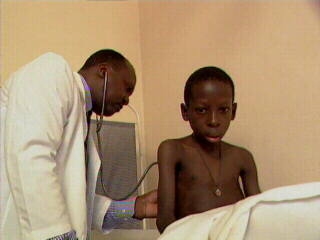Uganda - Paying The Price
 In Uganda, in a hospital in the capital Kampala, 14-year old Vincent is being treated for cryptoccocal meningitis, contracted as a result of AIDS. Underweight, frightened and wracked with pain, he is one of literally millions of AIDS orphans across Africa who will die in the next 10 years unless life-saving antiretroviral drugs become more widely available. But at current prices, the drugs are just too expensive for most African countries.
In Uganda, in a hospital in the capital Kampala, 14-year old Vincent is being treated for cryptoccocal meningitis, contracted as a result of AIDS. Underweight, frightened and wracked with pain, he is one of literally millions of AIDS orphans across Africa who will die in the next 10 years unless life-saving antiretroviral drugs become more widely available. But at current prices, the drugs are just too expensive for most African countries.
Ben Plumley of UNAIDS explains that competition and the development of generic (non-branded) drugs have lowered the price from the $12,000 a year paid in the West to around $300. But even this price is beyond the reach of most of the developing world.
The Ugandan Government came out openly and put all its efforts into defeating the AIDS crisis. Their early education and prevention programme has lowered the HIV rate from over 14% to 8% in ten years. This is a big achievement, but Dr Peter Mugyenyi, Director of the Joint Clinical Research Centre, Kampala, points out that it still means there are a hundred thousand new HIV infections every year.
Uganda realised that the most effective way of tackling the disease was to provide sufferers with the same treatment they'd receive in the West. Dr Mugyenyi says: "If you want to achieve prevention beyond a certain level you need to supplement it with treatment." So Uganda joined UNAIDS' scheme known as the Accelerating Access Initiative. As a result, Uganda has been able to buy the much needed drugs at very low prices, as Dr Mugyenyi explains: "The cost now of the brand is now a third of what it used to be, and the cost of generics has also come down because they are also traders just like brand manufacturers. And they also respond to competition."
The Accelerating Access Initiative is already making a difference in Uganda. But to afford the drugs, families often have to pool their resources for treatment. Teacher Evacy Kalemeera was close to death when she began the treatment six months ago. "My appetite was reactivated and I began feeling stronger from that time and I was able to go back to work - after almost two years." Dr Mugyenyi says that his life and the lives of his colleagues have been changed. "You know there is hope for a patient who comes to you. Previously it was like a funeral, only postponed."
The fight for affordable drugs in Africa first made world headlines last year when a consortium of 42 major pharmaceutical companies took the South African government to court over its right to import or manufacture generic drugs to treat AIDS sufferers. After a global campaign by activist groups, Trades Unions and NGOs, the 42 companies finally withdrew the case in April 2001 - in what was widely regarded as a humiliating climb-down.
However, despite the court case outcome, the South African government shocked the world by announcing that the cost of ARV drugs was still beyond the reach of the public health system which simply did not have the infrastructure to administer the drugs on a sustainable basis.
According to Sipho Mthathi of the Treatment Action Campaign: "Our government has let us down and in many ways, and has not shown real leadership in this issue. And has not really focussed on finding solutions." South Africa has the highest rate of HIV infection in the world with 4.7 million HIV-positive people - one in nine.
But while the South African government prevaricated, organisations such as Medecins Sans Frontières (MSF) in partnership with provincial clinics, had already started projects to provide AZT to pregnant women to reduce rates of MTCT - mother to child transmission of the virus. Khunjulwe is 34, and HIV-positive with four children. Her husband died of AIDS last year. She was given AZT when she was pregnant and her baby was born free of the virus. But then she developed full-blown AIDS.
Dr Eric Goemaere of MSF explains that over 7,000 women have now been through the MTCT programme, and the first results show that the transmission rate to babies has been 11% instead of 30-35% - "which means basically that hundreds of babies have been prevented to get HIV-positive, to be infected by the disease. And that's definitely good news."
The government has now started using AZTs to prevent mother-to-child transmission, but is still not supplying ARVs. But big corporations like Daimler Chrysler, usually seen as socially and morally unaccountable, are stepping in to fulfil what should be the government's responsibility. They've started supplying the HIV-positive members of their workforce and their families with ARVs. And MSF has started an ARV project at Khayalitsha on the outskirts of Cape Town. Khunjulwe is taking part in the trial, and is already feeling better. "For the first two weeks I had headaches and nausea. But then it stopped and I started feeling better. I'm eating normally and I'm feeling strong now."
Dr Herman Reuter of MSF says the results are already impressive. "Obviously we are doing this project to show to everybody - especially our government - that it is possible to treat people with anti-retrovirals in South Africa, in a township - in a squatter camp."
The developing countries are holding a whole-day debate to clarify trade and intellectual property rights at the next World Trade Organisation meeting this November. They want to ensure their rights to the drugs they need for health emergencies.
FULL SYNOPSIS

